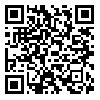BibTeX | RIS | EndNote | Medlars | ProCite | Reference Manager | RefWorks
Send citation to:
URL: http://jhsme.muq.ac.ir/article-1-59-en.html
2- Qom University of Medical Sciences, Qom, Iran ,
3- Islamic Azad University, Qom Branch, Qom, Iran
Background and Objectives: Most physicians believe that telling lies and withholding the truth is not permissible. However, it appears that holding the phenomenon telling the truth to be absolute or unconditional is not acceptable either. This study was conducted to examine Qom City physicians’ attitudes with regard to revealing the influential news to patients.
Methods: This was a descriptive-analytical investigation whose statistical population encompassed 150 physicians working in Qom City, including physicians engaged in hospitals, clinics, and medical offices. A tailor-made questionnaire was utilized to examine physicians’ attitudes to telling the truth to patients. SPSS Ver.16 was used to analyze data obtained in the study, employing the statistical tests of Independent T-Test, ANOVA, and chi-square.
Results: 41 (27.3%) male and 109 (72.7%) female physicians took part in this study. The mean work experience of the participants was 16.21±9.19. Overall, the attitudes of 36 physicians (24%) were low, 85 (56.7%) average, and 29 (19.3%) were weak. Pearson correlation coefficient indicated a positively significant relationship between work experience and attitude.
Conclusion: The results demonstrated that most physicians believed that telling lies is not absolutely prohibited for health professionals, who, in some certain cases, are permitted to do it. Moreover, it is concluded that patients’ level of knowledge, awareness, age, and other items should be taken into vigilant account upon disclosure of bad news to them, who are entitled to know about their health status.
Received: 2016/03/15 | Accepted: 2016/03/16 | Published: 2016/03/16
| Rights and permissions | |
 |
This work is licensed under a Creative Commons Attribution-NonCommercial 4.0 International License. |







